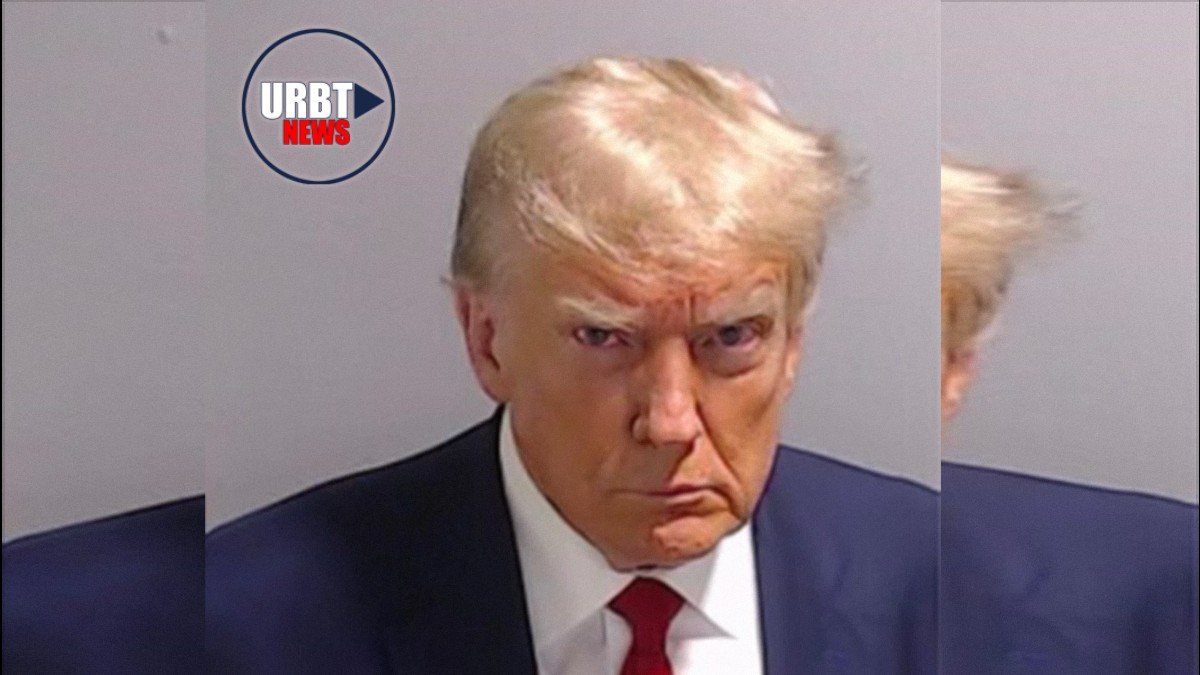
Uncharted Waters With Donald Trump
National News
Uncharted Waters With Donald Trump
The criminal indictments facing the twice-impeached former president and current presidential candidate Donald Trump have raised questions about requirements and disqualifications for holding public office in the United States. (PHOTO: COURTESY OF: donaldjtrump.com.)
Published
2 years agoon

Uncharted Waters
Uncharted Waters with Donald Trump. No president of the United States has ever been convicted of a felony. Although named an unindicted co-conspirator in the Watergate scandal in 1974, the federal government did not charge Nixon with a crime. He resigned from office before impeachment proceedings against him began, and President Gerald Ford later pardoned him. The list of former Presidents impeached while in office includes Presidents Andrew Johnson, Bill Clinton, and Donald Trump (twice). However, the United States House of Representatives acquitted each of these impeached presidents. The impeachments were not accompanied by criminal charges.
Donald Trump is the first sitting or former president of the United States to face criminal charges. With his third presidential bid for 2024 underway, the stakes are high for both him and the country.
Trump and Debs: The Odd Couple
If Trump ends up in that situation, he’ll be following in the footsteps of another rabble-rousing populist and frequent presidential candidate: avowed socialist Eugene V. Debs, who received nearly a million votes while imprisoned a century ago.
The comparison to Debs may not sit well with Trump, who frequently rails against socialists (or people he labels socialists). Some may also consider the comparison unfair to Debs. Debs is regarded as a hero by many in the labor and anti-war movements. Nonetheless, the two firebrands share a surprising amount of similarities.
Debs and his supporters attempted to use his legal woes as a rallying cry to propel his presidential candidacy. Trump similarly portrays the array of legal challenges he faces as political persecution.
Debs was far from the only person to run for president while imprisoned, but he was the most successful. While serving a 10-year federal sentence for opposing the World War I draft, he became the Socialist Party’s nominee in 1920.
He received 3% of the popular vote, a respectable tally for an imprisoned socialist. This was not nearly enough to force the country to seriously consider an unlikely constitutional question: What happens if an imprisoned candidate wins? Trump’s mounting legal problems resurrect that question. Trump victory from behind bars could open a constitutional can of worms.
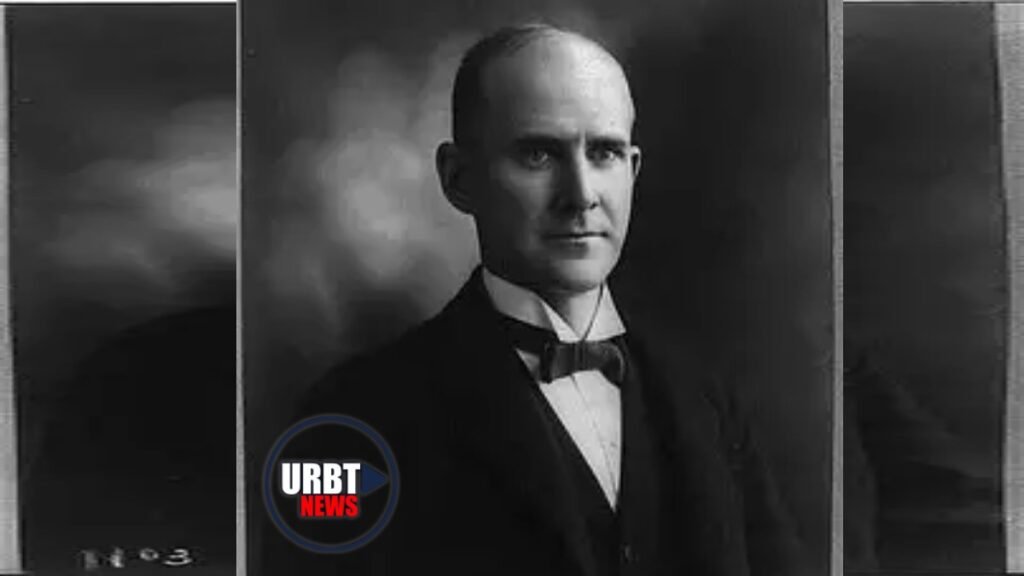
PICTURE: Eugene V. Debbs portrait, half, facing right.
Constitutional Requirements
There are few prerequisites for becoming President of the United States. Anyone over the age of 35, a natural-born citizen of the United States, and a resident of the United States for at least 14 years is eligible to be elected president, according to the United States Constitution. However, because the Constitution makes no mention of criminal records, a person indicted or convicted of a felony would not be barred from serving in the role if the other requirements were met.
In a 1995 case, the Supreme Court rejected Arkansas’ attempt to impose term limits on its U.S. senators and House members. That logic extends to any state’s attempt to declare a presidential candidate ineligible for reasons not specified in the Constitution. Mazo added, “The Supreme Court has said what’s in the Constitution are the only requirements you need to run for federal office.”
Because presidential requirements are written into the United States Constitution, Congress can only impose additional constraints by amending the Constitution. A constitutional amendment is difficult to pass. It requires a two-thirds majority vote in both the House of Representatives and the Senate. Furthermore, it must be approved by three-fourths of the nation’s state legislatures.
DOWNLOAD THE URBT NEWS APP Uncharted Waters With Donald Trump
Disqualifying Actions
There are no legal barriers to running for president as a convicted felon or even from behind bars. However, the 14th Amendment of the United States Constitution prohibits anyone from holding public office who has engaged in insurrection or rebellion against the United States. A two-thirds vote in both chambers of Congress overrides that prohibition. The clause was drafted after the American Civil War and makes no mention of other crimes.
The 22nd Amendment to the United States Constitution, which limits a president to two elected terms, is the only other constitutional restriction on running for elected federal office. The amendment was passed in the aftermath of President Franklin D. Roosevelt’s death in 1945, after he was elected four times, breaking a tradition of U.S. presidents stepping down after two terms. Members of Congress have no term limits.
Almost immediately after losing Georgia to Biden in 2020, Trump blamed his defeat on voter fraud, all while pressuring state officials to “find” votes in his favor.
Much of the controversy surrounding his efforts in Georgia revolved around a phone call between the former president and Georgia Secretary of State Brad Raffensperger on January 2, 2021. Trump directed his secretary to “find 11,780 votes” for him.
That phone call was leaked to The Washington Post and quickly made public. As a result, the various investigations into Trump’s efforts to overturn the election was sparked.
Trump’s Indictment Woes
Uncharted Waters with Donald Trump. Former President Donald Trump has received four criminal indictments a matter of months. This brings his total criminal charges this year to 91, with several of them carrying recommended prison time.
What happens after an arrest? Following an indictment, the charges are sometimes sealed until the defendant appears in court for the first time. In some cases, defendants or their attorneys make arrangements with law enforcement for self-surrender – or voluntarily turning themselves in. First appearances are usually held in public. Defendants are typically booked and fingerprinted upon their first appearance in court. A defendant will learn more about their rights, the charges against them, and the terms of their release, such as travel restrictions. If the first appearance is also an arraignment, a plea is likely to be entered.
The People of the State of New York against Donald J. Trump: Hush Money
The Manhattan district attorney indicted Trump on 34 counts in March 2023 on state charges related to a hush-money payment scheme for payments.
Stormy Daniels is an adult film actor. She has publicly claimed that she had sex with Trump in 2006 and was paid to remain silent about it. Trump has denied having an affair.
Karen McDougal is a model and actress. The former Playboy Playmate claims she had a months-long affair with Trump in 2006. She further claims was paid $150,000 by the National Enquirer to keep quiet about it. Trump has denied having an affair. Prosecutors could use the payoffs as proof that the schemes were designed to protect Trump’s electoral chances.
Prosecutors claim Trump was part of an illegal conspiracy to undermine the 2016 election’s integrity. They also claim he was a part of an illegal plan to conceal damaging information, including the $130,000 payment. When charged as a felony, the state charges carry a maximum sentence of four years in prison.
A $130,000 payment made by Trump’s then-personal attorney, Michael Cohen, to Stormy Daniels in late October 2016 is key evidence in the case. According to a source close to Trump, the grand jury’s decision to indict him caught him off guard. Trump has denied having an affair and has pleaded not guilty. The trial is set to start on March 25, 2024.
Trump and Allies React to Hush Money Indictment
Despite the fact that Trump did not speak to the media before or after his arraignment, Trump and his supporters have slammed District Attorney Alvin Bragg, a Democrat, and the grand jury’s decision, calling it “political persecution and election interference at the highest level in history.”
Trump’s advisers and allies have expressed concern about the former president being tried in Manhattan, citing the borough’s Democratic-leaning population as evidence that he will not receive a fair trial. “There is no way he gets a fair jury,” one adviser predicted. “What are they going to say – have you ever heard of Donald Trump? Have you been living under a rock?”
“Outrageous,” said Ohio House Judiciary Chairman Jim Jordan, one of the Republican committee chairs who has demanded that Bragg testify before Congress about the Trump investigation.
DOWNLOAD THE URBT NEWS APP Uncharted Waters With Donald Trump
United States v. Donald J. Trump: Election Interference
Trump’s second indictment is a result of special counsel Jack Smith’s investigation into alleged efforts by the former president and his allies to exploit the violence and chaos of the Capitol attack to overturn the 2020 election by continuing efforts to convince members of Congress to delay the certification of the election that day while rebuffing pleas that he directed the rioters to depart. Trump eventually told the rioters to go home in a recorded video message released at 4:17 pm that day.
In the charging documents, prosecutors stated that Trump “was determined to remain in power” after losing the 2020 election. His six unindicted co-conspirators allegedly plotted to overturn the results on and around January 6, 2021.
The goal was to create a “fake controversy” at the certification hearings in those states on December 14, 2020, and “position the Vice President – presiding as President of the Senate on January 6 – to supplant legitimate electors” with Trump’s phony ones. Prosecutors presented several examples of Trump’s aides telling him that the fraud claims he was promoting were false.
VOTER FRAUD IS NOT A CONSPIRACY THEORY, IT IS A FACT!!!— Donald J. Trump (@realDonaldTrump) December 24, 2020
“Fake Controversy”
According to the indictment, the acting attorney general and acting deputy attorney general informed Trump that the claim he continued to make in the aftermath of the 2020 election – that there were more votes than voters in Wisconsin – was false. Despite this, Trump continued to make the false claim, including on January 6. Trump also repeated the false claim that there were more than 200,000 illegal votes in Pennsylvania in the hours leading up to the Capitol attack, despite Justice Department officials telling him multiple times that the claim was false.
In Michigan, Trump claimed multiple times that an illegal vote dump occurred in the middle of the night during the 2020 election, despite Republican state leaders telling him at the time that he was wrong and had lost the state because he “had underperformed with certain voter populations in the state,” according to the indictment.
United States v. Donald J. Trump: Classified Documents
In June, Trump was indicted by a federal grand jury in Miami in special counsel Jack Smith’s probe for Trump’s allegedly mishandling of classified national defense documents after leaving the White House. He allegedly willfully retained national defense secrets in violation of the Espionage Act, made false statements, and conspired to obstruct justice by resisting the government’s attempts to retrieve the materials.
A recording of Trump discussing secret documents that he did not classify, about 100 classified documents discovered in an FBI search of Mar-a-Lago in August, and surveillance footage turned over to the Justice Department that allegedly shows Trump’s aide and codefendant are all key evidence in the case. Moving document boxes around the resort with Walt Nauta and a third defendant, Carlos de Oliveira. Trump has denied the allegations repeatedly and has pleaded not guilty. The Honorable Aileen Cannon, the judge in Trump’s classified documents case, scheduled to begin on May 4, 2024.
The indictment details instances in which Trump was informed that his claims were false by Vice President Mike Pence, the director of national intelligence, senior Justice Department officials, the Department of Homeland Security’s Cybersecurity and Infrastructure Security Agency, his staffers, state lawmakers, and state and federal courts. The charging documents refer to six co-conspirators on multiple occasions, but the court withholds their identities because they have not been charged with any crimes.
Trump Reacts to Classified Documents Indictment
Trump took to X to announce the indictment, hurling accusations at the Biden administration.
“The corrupt Biden Administration has informed my attorneys that I have been Indicted, seemingly over the Boxes Hoard, even though Joe Biden has 1850 Boxes at the University of Delaware,” Trump wrote on Truth Social that the criminal charges were the result of a sabotage attempt by President Biden, who has stayed out of the Department of Justice’s investigations into Trump because of this.
“The Right to Vote and Have One’s Vote Counted”
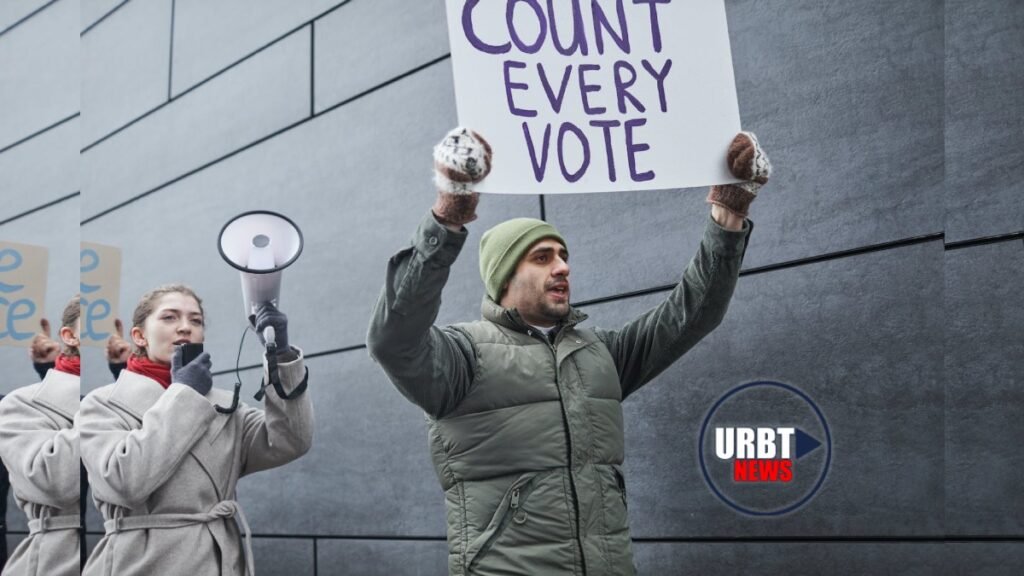
PICTURE: Protester with “Count Every Vote” sign.
The indictment charges with four counts of conspiracy to defraud the United States and obstructing an official proceeding. The federal government has successfully prosecuted rioters under the latter charge. Prosecutors are relying on a Reconstruction-era civil rights law in another charge brought against the former president, which prohibits conspiracies from depriving a person of their rights – in this case, “the right to vote and have one’s vote counted.”
According to the indictment, Trump and a co-conspirator “attempted to exploit the violence and chaos at the Capitol by calling lawmakers to convince them… to delay certification” of the election. Another co-conspirator is also accused of pressuring then-Vice President Mike Pence to “violate the law” in order to delay President Joe Biden’s victory. The indictment states that Trump “spread lies that there had been outcome-determinative fraud in the election and that he had actually won,” and that the “claims were false, and the Defendant knew they were false.”
Shortly after the indictment, the Trump campaign issued a statement denying the allegations and dismissing Smith’s case as a politically motivated “fake indictment.”
Prosecutors said in the indictment that key evidence in the case includes a phone call between then-President Donald Trump and Georgia Secretary of State Brad Raffensperger on January 2, 2021, in which Trump “lied” in an attempt “to induce him” to overturn the election and find the exact number of votes to flip his defeat in Georgia. Trump entered a not guilty plea on all four counts. The Honorable Aileen Cannon, the judge in Trump’s classified documents case, scheduled to begin on May 4, 2024, the day before primary elections in more than a dozen states.
Georgia v. Trump: Fulton County

Mugshot of former President Donald Trump. PHOTO: COURTESY OF: Fulton County Sheriff’s Office.
On August 14, 2023, a grand jury of 23 members in Fulton County, Georgia, indicted Trump and 18 political allies on 13 felonies. The historic indictment marks Trump’s fourth criminal case. The alleged charges stem from some of the former president’s and his allies’ most overt efforts to meddle in the 2020 presidential election, according to Fulton County District Attorney Fani Willis.
The charges against Trump include racketeering (violation of the Georgia RICO Act); three counts of solicitation, a breach of oath by a public officer; conspiracy to commit impersonating a public officer; two counts of conspiracy to commit forgery in the first degree; two counts of conspiracy to commit false statements and writings; conspiracy to commit filing false documents; filing false documents; and two counts of false statements and writings, for their efforts to over the state’s 2020 presidential election results.
If convicted of violating the Georgia RICO Act (Ga. Code § 16-14-4), which is classified as a “serious felony,” Trump faces a mandatory minimum sentence of five years in prison. The charge, a violation of Georgia’s Racketeer Influenced and Corrupt Organizations Act, or RICO, serves as a catch-all for a number of allegedly criminal actions taken by the group in order to advance their so-called enterprise.
Key evidence in the case includes Trump’s infamous phone call with Georgia Secretary of State Brad Raffensperger. Trump asked Raffensperger to “find” the votes he needed to win the state, the fake elector scheme. A September 2021 letter he sent to Raffensperger urging him to decertify the state’s 2020 vote, and surveillance video and text messages. Other communications unearthed during a civil case provided crucial evidence for prosecutors investigating efforts. by Trump and his allies to overturn the 2020 election results in Georgia.
Trump Reacts to Georgia Election Interference Indictment
Donald Trump responded to his latest indictment by calling it a “witch hunt” and accusing Fulton County District Attorney Fani Willis of being “racist and corrupt.” Trump condemned what he called a politically motivated “witch hunt” on his Truth Social network.
DOWNLOAD THE URBT NEWS APP Uncharted Waters With Donald Trump
E. Jean Carroll v. Donald J. Trump: Trump’s Other Legal Woes
Uncharted Waters with Donald Trump. Earlier this year, a jury found Trump liable Trump liable for sexually abusing and defaming former Elle advice columnist E. Jean Carroll, with a jury awarding Carroll $2 million for sexual abuse and $3 million for defamation.
Expert Analysis
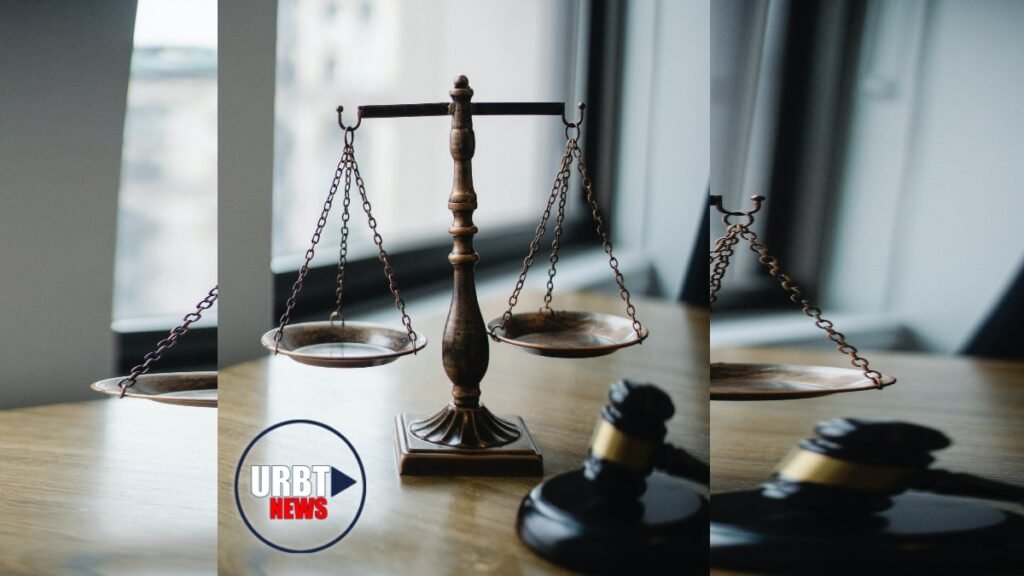
PICTURE: The balance (scales) of justice and justice gavel. The scales represent weighing facts and evidence to decide a verdict. It also shows the duty to restore balance to society. The gavel is a symbol of the authority and right to act officially in the capacity of a presiding officer.
The tangle of unprecedented political, legal, and historical ramifications of a person in prison becoming president is a difficult question.
“There’s nothing barring Trump from running. Even a federal conviction doesn’t prevent that. … Even if he were mentally insane,” Seton Hall law professor Eugene Mazo said. “The Supreme Court has said what’s in the Constitution are the only requirements you need to run for federal office.”
Many experts believe that Trump will not serve time in prison, even if convicted. This because judges rarely sentence first-time offenders to prison for that type of felony.
Legal scholars believe the need for a duly elected president to carry out their duties would trump a criminal conviction. They believe that the federal government will intercede and suspend the state’s sentence. It is unclear whether the federal government will postpone the federal sentence. Still, the question may be moot if the new president uses his pardon power to set himself free. Another scenario involves pardoning himself from any pending federal charges immediately upon taking office, as Debs promised if he won.
Trump will not be able to pardon himself or his allies. Nor will he be able to dismiss the Fulton County prosecutors bringing the charges.
“If Trump attempted to do that, it would probably create some sort of constitutional crisis,” said David Stebenne. Stebenne is a professor of history and law at Ohio State University.
Innocent Until Proven Guilty
Uncharted Waters with Donald Trump. A presumption of innocence means that any defendant in a criminal trial the trier of fact holds the defendant innocent unless or until they proven guilty. It further means that the burden of proof is always on the government to satisfy. In a criminal case, the burden of proof is “beyond a reasonable doubt.”
Many people admire Trump, but nobody believes he will go to prison if convicted. Meanwhile, Trump will continue with his campaign.
Trump, his family, and his supporters have repeatedly and insistently denied wrongdoing in the various criminal, congressional, and civil inquiries.
DOWNLOAD THE URBT NEWS APP Uncharted Waters with Donald Trump
You may like
-


Single Men & Step-Fatherhood: Crucial Considerations Before Taking the Plunge
-
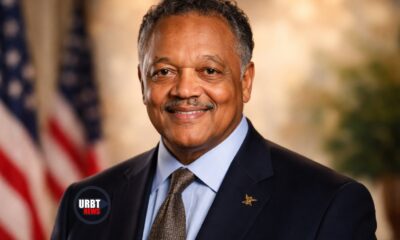

Jesse Jackson Dies at 84: Civil Rights Icon’s Legacy
-


Minority Births Surpass White Births: A Demographic Shift Impacting America
-


Hot Girl Summer: Your Guide to Confidence, Fun, and Intentional Living
-


Shrek as a Cautionary Tale: Unmasking the Ogre’s Life Lessons
-


Test Your Spelling Skills: How Good Are You Without Technology?


